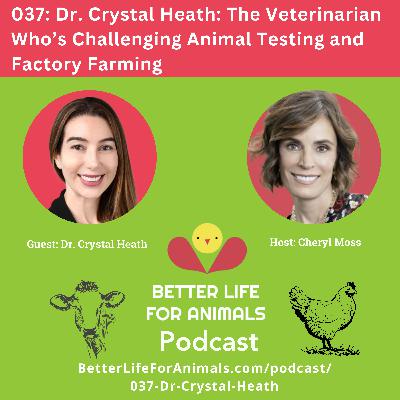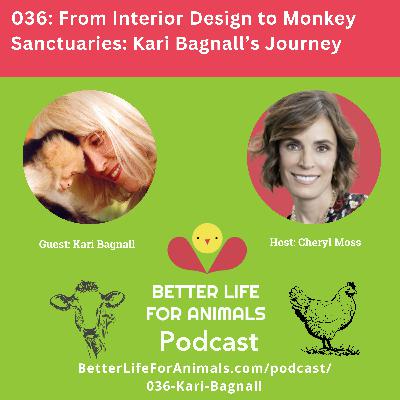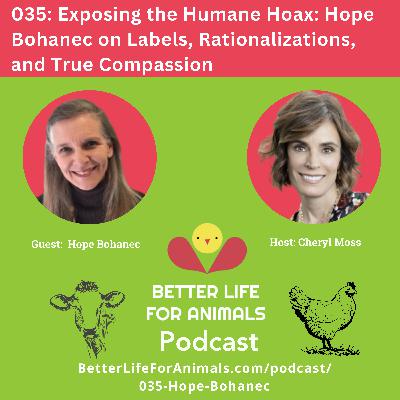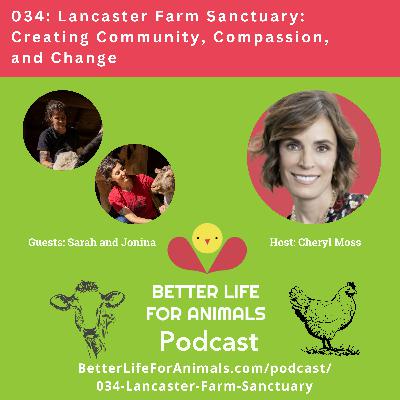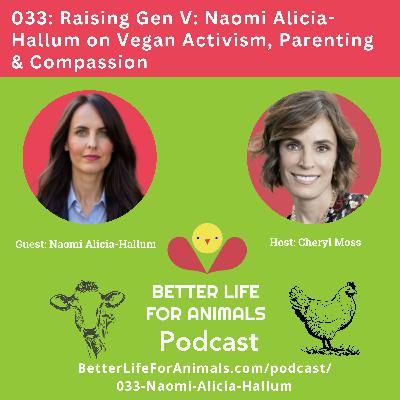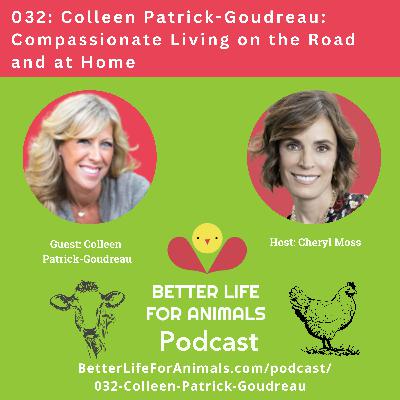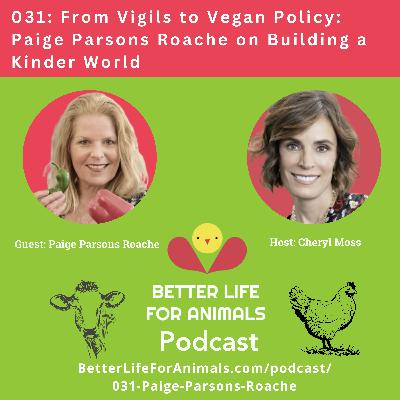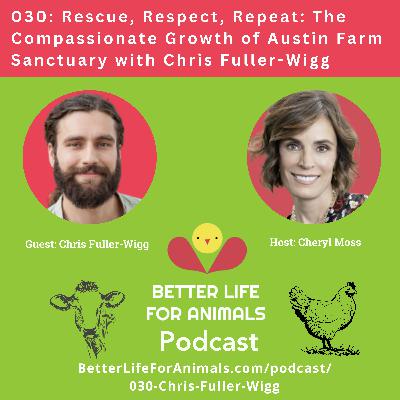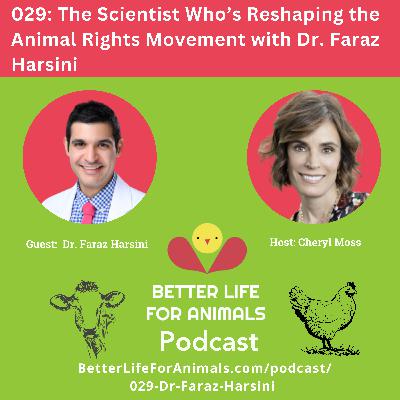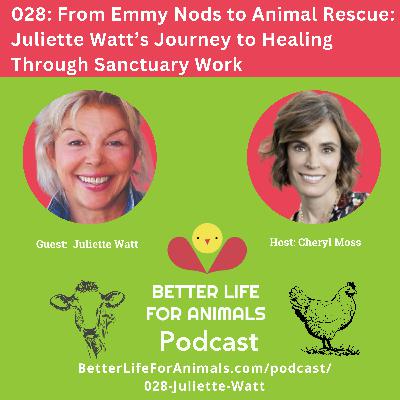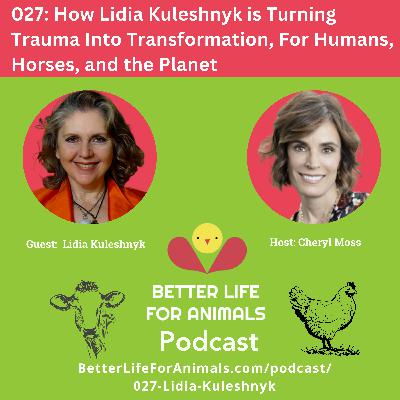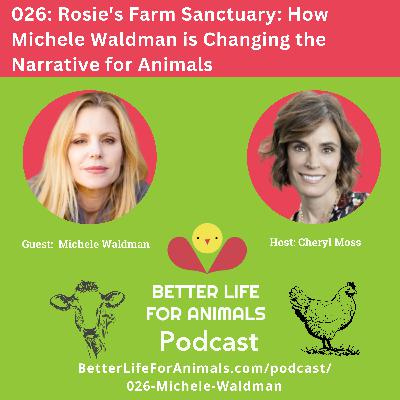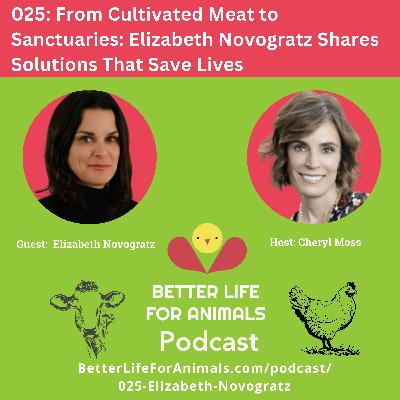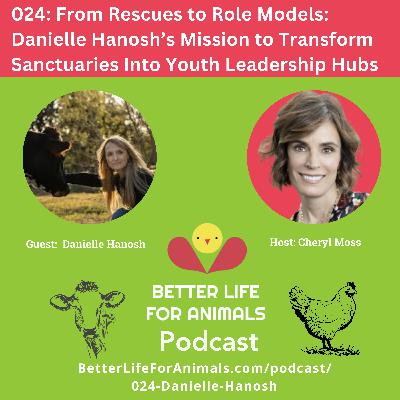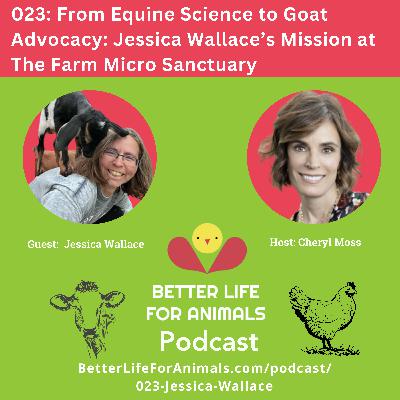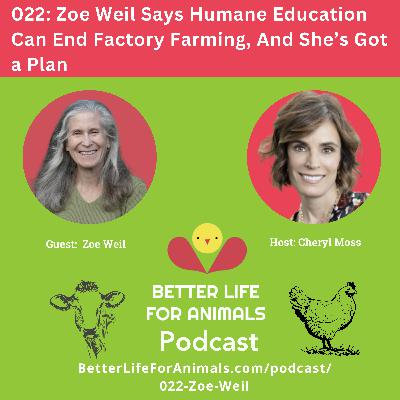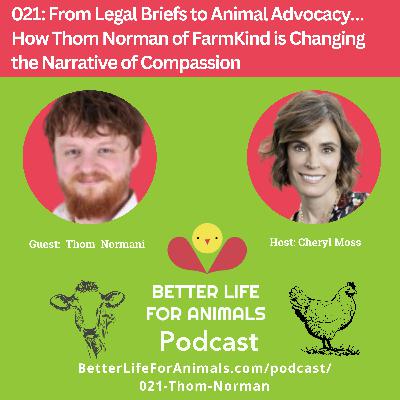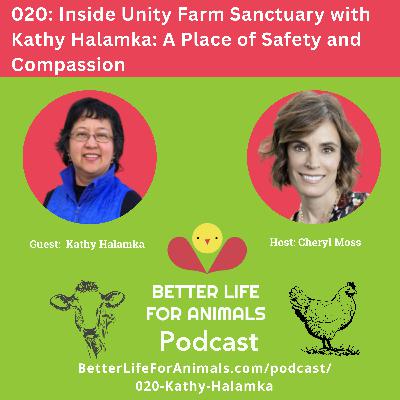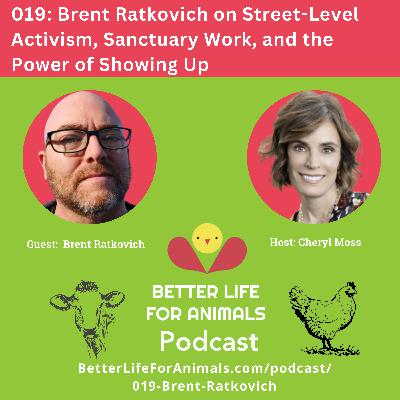Discover Better Life for Animals
Better Life for Animals

Better Life for Animals
Author: Cheryl Moss
Subscribed: 1Played: 6Subscribe
Share
© 2025
Description
Better Life for Animals is your go-to podcast for powerful stories from animal sanctuaries, vegan activists, and animal welfare changemakers. Each episode dives into real-life journeys of rescuing farmed animals, building compassionate communities, and living a cruelty-free, plant-based lifestyle.
Hosted by animal advocate Cheryl Moss, the show highlights how rescue sanctuaries across the globe give abused and abandoned animals a second chance at life. You'll hear from nonprofit founders, vegan thought leaders, and animal rights experts who are creating a better world—one animal at a time.
Whether you're passionate about ethical living, run a small sanctuary, or simply want to support animal rescue efforts, this podcast will inspire and empower you to take action. Tune in and discover how you can help create a better life for animals everywhere.
Hosted by animal advocate Cheryl Moss, the show highlights how rescue sanctuaries across the globe give abused and abandoned animals a second chance at life. You'll hear from nonprofit founders, vegan thought leaders, and animal rights experts who are creating a better world—one animal at a time.
Whether you're passionate about ethical living, run a small sanctuary, or simply want to support animal rescue efforts, this podcast will inspire and empower you to take action. Tune in and discover how you can help create a better life for animals everywhere.
39 Episodes
Reverse
What if the way we live with animals could change everything? In this episode, Dr. Katherine Baxter, co-founder and CEO of the Alliance for Human-Animal Coexistence (AHAC), shares how she is leading a movement to turn conflict into cooperation, from elephants in Kenya to wolves in North America. You will hear how a simple idea, planting sunflowers instead of maize, transformed entire communities, stopped crop raids, and created new sources of income. These same lessons are now being applied to predator conservation around the world. Dr. Baxter brings decades of experience in animal welfare, ecology, and social justice to her work, showing what it truly means to live by the African philosophy of Ubuntu, "I am because we are." By the end, you will see how coexistence is not just a concept, it is a choice. Every meal, every donation, every act of empathy matters. Listen now to discover how small actions can create big change for animals, people, and the planet. Full post at: www.BetterLifeForAnimals.com/podcast/038-Dr-Katherine-Baxter
Veterinarian and activist Dr. Crystal Heath has built a groundbreaking career rooted in courage, conscience, and compassion. As the executive director of Our Honor, she leads a growing movement of veterinarians who challenge unethical practices in animal testing, factory farming, and education. In this episode, Dr. Heath discusses her journey from 4-H to animal advocacy, how she stood against ventilation shutdown during the pandemic, and why she believes the veterinary field must confront its moral contradictions. She also shares how Our Honor supports whistleblowers who speak out against cruelty and her vision for a compassionate, cruelty-free future for animals. Episode highlights: Why veterinary education must reform its use of animals The emotional toll of speaking up against industry norms How Our Honor helps veterinarians protect their ethics The growing movement for compassionate food and medical systems Visit www.BetterLifeForAnimals.com/podcast/037-Dr-Crystal-Heath for full show notes and resources.
If you've ever wondered how one small moment can completely change the course of your life, this episode is for you. It started with a baby monkey named Samantha riding on the back of a poodle. That single image changed everything for Kari Bagnall. She walked away from a successful career in interior design and built a sanctuary that now gives nearly 200 monkeys a safe and loving home. In today's episode, you'll hear how one act of compassion led to the creation of Jungle Friends Primate Sanctuary in Gainesville, Florida— a refuge for monkeys rescued from research labs, the pet trade, and neglect. But this conversation goes deeper than rescue stories. You'll learn how: Kari discovered the heartbreaking reality of monkeys used in medical research Decades of isolation and trauma impact their ability to trust and heal True sanctuaries differ from zoos and why that difference matters Jungle Friends helps primates rediscover their natural instincts and connections Compassion can create lasting change, one life at a time Running a 50-acre sanctuary isn't easy. It takes heart, courage, and nearly $100,000 a month to keep it all going. Kari shares how she stays committed, the power of connection between primates, and what it really means to give another being a second chance at life. Her message is simple but powerful: Humans are poor surrogates for monkey friends. They need each other, and they deserve a second chance. This isn't just a story about rescue. It's about empathy, healing, and what happens when one person decides to do something extraordinary. Full post at: www.BetterLifeForAnimals.com/podcast/036-Kari-Bagnall
What if the biggest barrier to living our values isn't ignorance, but comfort? In this eye-opening conversation, longtime activist and author Hope Bohanec joins Kathleen to reveal the truth behind "humane" and "sustainable" labels. These words make us feel better about consuming animal products—but do they actually make a difference? You'll learn why many so-called ethical food labels are designed to protect consumers' emotions, not animals. Hope shares what she discovered after decades investigating farms that claimed to treat animals humanely—and what she found will challenge everything you think you know. Hope is the founder of Compassionate Living, creator of The Humane Hoax Project, and author of The Ultimate Betrayal and The Humane Hoax. For over 30 years, she's been a leading voice exposing how the meat, dairy, and egg industries manipulate language to hide systemic cruelty. In this powerful, research-backed conversation, Hope exposes how "greenwashing" and "humane washing" distort our perception of compassion and sustainability—and what each of us can do to live in alignment with our values. You'll learn: Why "cage-free," "free-range," and "grass-fed" labels exist to comfort consumers, not protect animals How greenwashing misleads us about sustainability and climate impact What Hope found inside "humane" farms that changed her life forever Why plant-based living is the clearest path to compassion and consistency How community and grassroots activism can drive real change If you've ever felt torn between your love for animals and what's on your plate, this episode will open your eyes. Because real compassion doesn't need a label—and this conversation shows you why. For more resources related to today's episode, including links to Hope's work and the Humane Hoax Project, click here for the podcast episode page. Full post on Hope's episode at www.BetterLifeForAnimals.com/podcast/035-Hope-Bohanec
In the heart of Lancaster County, Pennsylvania, where animal agriculture dominates the landscape, Lancaster Farm Sanctuary stands as a beacon of compassion. Co-founders Sarah Salluzzo and Jonina Turzi launched the sanctuary in 2017 with the mission to rescue farmed animals, educate the public, and build a plant-based community grounded in kindness and connection. What began as a small property with no staff has grown into a thriving nonprofit with nearly 100 rescued residents, 40 volunteers, and a team of dedicated caregivers. Sarah, a social worker and nonprofit professional, and Jonina, a doctor of physical therapy specializing in trauma-informed care, have created a haven where animals experience peace and dignity. In this episode, Sarah and Jonina share the realities of running a sanctuary, the challenges they face, the triumphs they celebrate, and the commitment it takes to care for every animal. They also highlight the importance of education through programs like the Pen Pal initiative, which connects schoolchildren with rescued animals, and their documentary The Choice Is Yours, which explores the impact of animal agriculture on health and the environment. From heartwarming rescues to their annual Gala for the Animals, Lancaster Farm Sanctuary continues to inspire compassion and community. Learn how you can get involved, support their mission, and be part of a movement that is creating a kinder world for all beings. Listen now to discover how Lancaster Farm Sanctuary is redefining what it means to care for animals, people, and the planet. Full post at: www.BetterLifeForAnimals.com/podcast/034-Lancaster-Farm-Sanctuary
Naomi Alicia-Hallum, CEO of Generation Vegan (Gen V), shares her journey from growing up in a rural English farming village to leading one of the most influential global vegan organizations. Under her leadership, Gen V has delivered over 360,000 vegan meals, guided 160,000 people toward plant-based living, and inspired international campaigns challenging leaders to act for animals, the planet, and humanity. Naomi discusses compassionate parenting, reaching audiences beyond the vegan community, and how Gen V empowers people to take meaningful first steps—without judgment or perfection. Her story is a reminder that each of us can help shape a kinder, more sustainable world, starting with what's on our plate. Full post at: www.BetterLifeForAnimals.com/podcast/033-Naomi-Alicia-Hallum
In 1985, only 200 mountain gorillas were left in the wild. Today their numbers are growing thanks to conservation and ecotourism. In this episode, Cheryl welcomes Colleen Patrick-Goudreau, author and founder of Joyful Vegan Trips, to discuss how we can live more compassionately every day. Colleen shares why labeling food as vegan can sometimes turn people away and how focusing on flavors and ingredients makes plant-based meals inviting to all. She explains how Joyful Vegan Trips creates authentic, satisfying travel experiences with plant-based meals that celebrate local culture. The conversation also covers the importance of supporting real sanctuaries that put animals first, from elephant refuges in France to gorilla conservation treks in Rwanda. Colleen introduces her latest book, A Year of Compassion, which provides weekly actions to help people live with kindness and purpose. This episode is about practical, inspiring ways to bring compassion into daily life, whether at home, in restaurants, or while traveling. Full post at: www.BetterLifeForAnimals.com/podcast/032-Colleen-Patrick-Goudreau
A single plant-based meal can save 1,000 gallons of water. That simple fact fuels Paige Parsons Roache's mission to build a kinder, more compassionate world. Host Cheryl Moss sits down with Paige, a full-time activist and media professional whose journey began when her daughter chose to go vegan. That decision led Paige from family cooking experiments to animal vigils, and eventually to a leadership role amplifying plant-based and ethical living through Unchained TV, grassroots campaigns, and vegan policy initiatives. In this episode Paige shares: How animal vigils shaped her advocacy Why sanctuaries create empathy and inspire change The impact of campaigns like Plant Based Treaty and Support and Feed Practical steps anyone can take to contribute to a compassionate future Paige's message is clear. You do not have to do everything, but everyone can do something. Full post at: www.BetterLifeForAnimals.com/podcast/031-Paige-Parsons-Roache
Austin Farm Sanctuary, founded by Chris and Angela Fuller-Wigg, has grown from rescuing two goats on a half-acre to providing refuge for more than 240 farm animals on 95 acres in Cedar Creek, Texas. In this episode, Chris shares how a simple act of compassion became a thriving mission built on respect, sustainability, and community. From events like Doya Palooza to youth programs and virtual tours, discover how the sanctuary educates, inspires, and creates change for animals far beyond Texas. Full post and video at: www.BetterLifeForAnimals.com/podcast/030-Chris-Fuller-Wigg
Most people do care about animals, yet support industries that harm them. On this episode of the Better Life for Animals Podcast, I talk with Dr. Faraz Harsini about why this happens and what we can do to change it. Dr. Harsini shares his personal journey from believing animal use was "necessary" to becoming a leading voice in plant-based science and student empowerment. He outlines how Allied Scholars for Animal Protection is creating systems of change in universities across the United States. From cultivated meat to replacing animal testing with human-relevant science, this conversation is filled with practical solutions and long-term vision. Full episode at: www.betterlifeforanimals.com/podcast/029-Dr-Faraz-Harsini #AnimalRights #PlantBasedFuture #CrueltyFreeScience #AlliedScholarsforAnimalProtection #BetterLifeForAnimalsPodcast
Most people have heard of burnout. Fewer recognize it as the deeper emotional exhaustion known as compassion fatigue—a condition that can affect anyone who spends their life caring for others. In this powerful episode of the Better Life for Animals Podcast, host Cheryl Moss sits down with Juliette Watt, an Emmy-nominated writer, former ATP pilot, and long-time animal rescuer, to explore what happens when caregivers hit their breaking point. Juliette shares her incredible journey, from working at Best Friends Animal Society during Hurricane Katrina to finding healing through her deep bond with horses. Together, they discuss the emotional cost of animal sanctuary work, the importance of recognizing trauma, and how our third act in life can be filled with purpose and peace. This episode is a must-listen for anyone working in animal rescue, caregiving, or advocacy—or anyone who has ever felt emotionally depleted from giving too much. It's a reminder that healing is possible, and that sanctuaries save more than animals—they save people too. Full post: www.BetterLifeForAnimals.com/podcast/028-Juliette-Watt
Most horses are rehomed an average of seven times during their lifetime. This instability often results in neglect, emotional distress, or a tragic end in the slaughter pipeline. In this episode of the Better Life for Animals Podcast, Cheryl Moss speaks with Lidia Kuleshnyk, also known as Lady Apona, founder of AponaHealing.com. Lidia discusses her mission to heal the disconnection between humans and nature. She explains her L.O.V.E. Method, her use of Ho'oponopono to bring healing energy to horses, and her vision for creating equine land trusts and forever sanctuaries. She also outlines the seven spiritual steps that guided her in rescuing her first horse, a process that now inspires her clients. Listeners will discover how horses can help people process grief, manage stress, and heal trauma while also learning how sanctuaries can provide the stability and reverence that every horse deserves. Full post: www.BetterLIfeForAnimals.com/podcast/027-Lidia-Kuleshnyk
Can a 5-acre sanctuary in suburbia change how we treat farmed animals? Michele Waldman says yes—and she's living proof. In this episode of the Better Life for Animals Podcast, Michele shares how she founded Rosie's Farm Sanctuary in a residential Maryland neighborhood to bring compassion closer to home. A licensed psychotherapist, Michele uses her deep understanding of trauma to connect people with animals in transformative ways. At Rosie's, rescued farm animals become teachers, and youth become leaders through LEAP internships, immersive tours, and hands-on humane education. From pigs painting snout art to launching state legislation, this sanctuary blends joy, healing, and justice. Don't miss Michele's inspiring journey into animal advocacy, healing, and public education. www.BetterLifeForAnimals.com/podcast/026-Michele-Waldman
More than 70 billion land animals are raised and slaughtered every year, yet most people rarely think about the individuals behind those numbers. Elizabeth Novogratz, founder of Species Unite, is working to change that. In this conversation with Better Life for Animals Podcast host Cheryl Moss, Elizabeth shares her journey from witnessing cruelty in the global animal trade to building a nonprofit media platform that inspires global action. What you'll learn in this episode: Why 70% of Species Unite's non-vegan audience reports reducing or eliminating animal products The promise of cultivated meat and plant-based innovation to replace animal products worldwide How storytelling can transform public perception — from misunderstood wolves to rescued orangutans The value of a judgment-free approach in animal advocacy About Our Guest: Elizabeth Novogratz is the founder and president of Species Unite, a media nonprofit dedicated to creating a more compassionate world for animals. More at: www.BetterLifeForAnimals.com/podcast/025-Elizabeth-Novogratz
Less than 3% of American students receive humane education, yet it's one of the strongest predictors of ethical leadership. In this powerful episode of Better Life for Animals, host Cheryl Moss speaks with Danielle Hanosh, co-founder of LEAP (Leaders for Ethics, Animals, and the Planet) and Blackberry Creek Farm Animal Sanctuary. A former middle school teacher, Danielle shares how her passion for education and animal welfare inspired a national movement that's transforming farm sanctuaries into youth leadership hubs. LEAP is a compassionate alternative to 4-H and FFA, teaching students public speaking, ethical decision-making, climate literacy, and animal protection—without compromising their empathy. In This Episode: Why sanctuaries are ideal spaces for leadership development The heartbreaking truth behind traditional youth ag programs like 4-H How LEAP empowers kids to question the norm and speak up for animals Stories of student transformation—including one child who found their voice How your sanctuary can become a certified LEAP hub The importance of empathy in solving the climate, mental health, and compassion crises Danielle's mission is clear: raise ethical leaders, not just animal advocates. Whether you're an educator, sanctuary operator, or advocate for change, this episode will leave you inspired to reimagine how the next generation learns about animals, the planet, and their own power to lead. Full post: www.BetterLifeForAnimals.com/podcast/024-Danielle-Hanosh
Most people don't expect to find a thriving farm animal sanctuary nestled on just four acres of land in Indiana. But Jessica Wallace isn't most people. A lifelong animal lover with a background in equine sciences and veterinary care, Jessica joined Cheryl Moss on the Better Life for Animals Podcast to share how her small but mighty sanctuary is making a big difference, especially for goats. A Lifelong Passion Sparked by Horses Jessica's journey started with a love for horses. She earned an associate degree in equine sciences and worked in veterinary clinics for over a decade. In 2012, she bought a property so her horse could live at home. That decision eventually led to the founding of The Farm Micro Sanctuary. Goats Opened Her Heart and Her Eyes In 2019, Jessica rescued her first three goats. She was immediately taken by their intelligence, curiosity, and charm. "We're not taught how amazing goats are," she said. The turning point came when she took in Millie, a disabled goat from a dairy. Millie had given birth despite being unable to walk. Once her baby was taken, she was discarded. Jessica stepped in, and Millie has been with her ever since. "She's fierce and amazing," Jessica said. "She changed everything for me." Full post at: www.BetterLifeForAnimals.com/podcast/023-Jessica-Wallace
Factory farming produces over 70 billion land animals every year—yet most students are never taught to question the system behind it. In this eye-opening episode of the Better Life for Animals Podcast, we sit down with Zoe Weil, co-founder and president of the Institute for Humane Education (IHE), to explore how education can be a powerful force for compassion, justice, and change. Zoe introduces us to solutionary education—an innovative, systems-based approach that teaches students to identify and solve real-world problems affecting people, animals, and the environment. From factory farming to climate change, this model empowers the next generation to become changemakers, critical thinkers, and conscious consumers. In this episode, you'll discover: What solutionary education is and why it matters How schools can integrate humane, ethical, and environmental learning into every subject Why hope is a teachable skill, not just a feeling How animal sanctuaries play a crucial role in shifting perspectives The "True Price" lesson that reveals the hidden cost of everyday choices How cultivating solutionary thinking can help dismantle factory farming for good Whether you're an educator, activist, parent, or simply someone who wants to build a more ethical world, this episode offers a roadmap for creating real impact through education. Full post: https://www.BetterLifeForAnimals.com/podcast/022-Zoe-Weil
Can $23 a Month Offset Animal Suffering? Thom Norman of FarmKind Explains Can a small monthly donation create massive impact for animals? In this episode of Better Life for Animals, host Cheryl Moss sits down with Thom Norman, co-founder and director of Outreach at FarmKind, to explore how $23 a month can reduce the suffering caused by an average omnivorous diet. Thom introduces the concept of diet offsetting, a practical and inclusive solution for those who care about animals but may not be fully plant-based. Through FarmKind's Compassion Calculator, individuals can measure the impact of their dietary choices and offset harm by donating to carefully vetted, high-impact animal charities. Thom shares his personal journey from corporate law to full-time animal advocacy, inspired by his own companion animals and the powerful message of The Life You Can Save. He also highlights how corporate campaigns, like the move toward cage-free eggs, are achieving real change at scale. What you'll learn: How diet offsetting empowers more people to help animals Why $1 can free a chicken from a battery cage How transparency and accountability build donor trust What makes FarmKind's giving strategy unique and effective Why you do not have to be fully vegan to start making a difference Whether you are a lifelong vegan or just beginning your journey toward more compassionate living, this episode will show you how your dollars can do more than you ever imagined. Full post: https://www.betterlifeforanimals.com/podcast/021-Thom-Norman
Unity Farm Sanctuary in Sherborn, Massachusetts is home to over 250 rescued animals, including cows, pigs, goats, turkeys, ponies, and llamas. Founded in 2016 by Kathy and John Halamka, the sanctuary provides lifelong refuge to farmed animals while serving as a hub for humane education and community outreach. Co-founder Kathy Halamka brings her background in business and the arts to every aspect of the sanctuary. From coordinating volunteers to sharing stories through photography and writing, her hands-on leadership helps people connect deeply with the animals and the mission. Unity's residents are never adopted out. Once they arrive, they become permanent family members. For animals they cannot take in, Kathy works with other sanctuaries to ensure safe, long-term placements with thoughtful planning and support. With over 1,300 volunteers and a growing base of monthly donors and sponsors, Unity relies on community support to thrive. Fundraising efforts are transparent and mission-driven, including animal sponsorships, legacy giving, and events like Dudley Fest. Education is at the core of Unity's work. Programs serve all ages, including the LEAP initiative, which offers students an ethical alternative to traditional 4-H and FFA programs. Tours and workshops promote kindness, compassion, and respect for animals as sentient beings. To learn more, support the mission, or schedule a visit, go to www.unityfarmsanctuary.org. Full post and other episodes: www.BetterLifeForAnimals.com/podcast/020-Kathy-Halamka
Less than 1 percent of U.S. animal product consumers ever witness the conditions inside factory farms. Brent Ratkovich is part of the small percentage who has, and he has turned that truth into tireless action. In this episode, Cheryl Moss sits down with longtime animal advocate Brent Ratkovich, whose journey from personal health transformation to frontline activism highlights the power of everyday people making an extraordinary impact for animals. From solo street protests to large-scale hen rescues, Brent's story is a powerful reminder that when it comes to animal rights, silence is never neutral. A Spark Ignited by Compassion Brent's vegan journey began in 2013 for health reasons, but everything changed after watching the documentary Meet Your Meat. What started as a personal lifestyle shift quickly evolved into a public mission. He began attending protests with Mercy for Animals and soon launched One Cow Army, a bold solo outreach effort designed to grab attention and plant seeds for compassion through simple signs and meaningful conversations. Taking Action Where It Matters Most Within two years of going vegan, Brent was fully immersed in sanctuary life. His volunteer work with Animal Place Sanctuary included hands-on caregiving, barn cleaning, and life-saving rescue missions. From the emotional weight of pulling hens from the brink of death to the joy of watching them dust bathe for the first time, Brent understands what it takes to restore dignity to animals who have endured suffering. He also volunteers at other sanctuaries, including Harvest Home, Blue Barn, and Welcome Home Sanctuary. His message is clear: sanctuaries need both financial support and boots-on-the-ground help to keep going. https://betterlifeforanimals.com/podcast/019-Brent-Ratkovich



